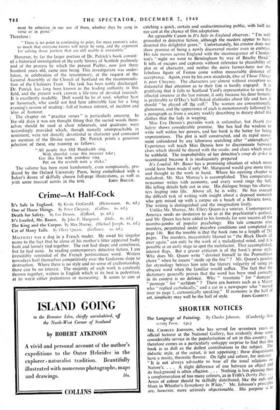Crime—At Hal f-Cock
MALFICELI was a dog in a French reader. He owed his singular name to the fact that he alone of his mother's litter appeared badly built and loosely tied together. The rest had shape and comeliness, but he had none. In reading contemporary detective fiction, I am irresistibly reminded of the French portmanteau word. Writers nowadays hurl themselves competitively over the Gadarene slope to destruction. Where there is no style and no sense of craftsmanship, there can be no interest. The majority of such work is carelessly thrown together, written in English which at its best is pedestrian, at its worst either pretentious or nauseating. It seems to aim at
catching a quick, certain and undiscriminating public, with half an eye cast at the chance of film adaptation.
An agreeable Canon in It's Safe in England observes: " I'm well grounded in detective fiction, although the masters appear to have deserted this delightful genre." Unfortunately, his creator does not show promise of being a newly discovered master even in embryo. His tale moves across England with the inconsequence of Chester- ton's " night we went to Birmingham by way of Beachy Head." It tells of escapes and captures without reference to plausibility of plot or of character, and neither the naive farmer-hero nor the fabulous figure of Feston come within measurable distance of acceptance. Again, even by his own standards, One of Those Thingi is poor Cheyney. The characters are' almost without exception so distasteful that attention as to their fate is hardly engaged.. It is gratifying that it falls to Scotland Yard's representative to save the affected amateur at the last minute, if only because his dour honesty is preferable to O'Day's half-baked platitudes about life and how it should " be played off the cuff." The women are conventionally glamorous, and the appearance of each is monotonously followed by a paragraph as from a society weekly describing in dreary detail the clothes that the lady is wearing. Miss Eve Dennis's previciUs work is unfamiliar, but Death for Safety shows considerable promise. She has had the wisdom to write well within her powers, and her book is the better for being unpretentious. The plot is well constructed, and its rapid move- ment unhindered by any laborious searching after "atmosph.:re." Experience will teach Miss Dennis how to discriminate between clues which should be shared with the reader and clues which must be withheld. The improbability of her detective's coup de gtdce is accentuated because it is inadequately prepared Ifs Loaded, Mr. Bauer has a promising situation of which more could have been made if only Mr. Marquand would give more time and thought to the work in hand. Where his opening chapter is maladroit, Mr. Max Murray's is accomplished. This comparative newcomer writes with economy, and every word rings the bell. His telling details hole out in one. His dialogue brings his charac- ters leaping into life. Above all, he is witty. He has essayed the difficult task of writing with insight about a deposed monarch who gets mixed up with a corpse on a beach of a Riviera town. The writing is distinguished and the imagination lively.
Unlike Mr. Murray, Mr. Ellcry Queen is a veteran. Contemporary America needs no invitation to sit in at the psychiatrist's parlour, and Mr. Queen has here added to his formula for sure success all the mumbo-jumbo of popular psychology. His tale concerns nine murders, perpetrated under macabre conditions and completed on page 146. But the trouble is that the book runs to a length of 281 pages. The murders, inaccur.ftely likened to "the Black Death all over again," can only be the work of a maladjusted mind, and it is possible at an early stage to spot the malefactor. That accomplished, interest flags. But a graver criticism is of the book's prose style. Why does Mr. Queen write " devoted himself to the Promethean chore " when he means " infftle up the fire " ? Mr. Queen's passion for etymology betrays him into the literary vulgarity of using an obscure word when the familiar would suffice. The fact that the dictionary generally proves that the word has been used correctly in its context is no defence. Why " traumata " for " damage,- " peonage " for " serfdom " ? There are horrors such as a Mayor who " replied carbolically." and a cat in a newspaper who " moved over to page 1. cartoonically speaking." If economy is the half of
art, simplicity may well he the half of style. JOHN GARRETT.


































 Previous page
Previous page